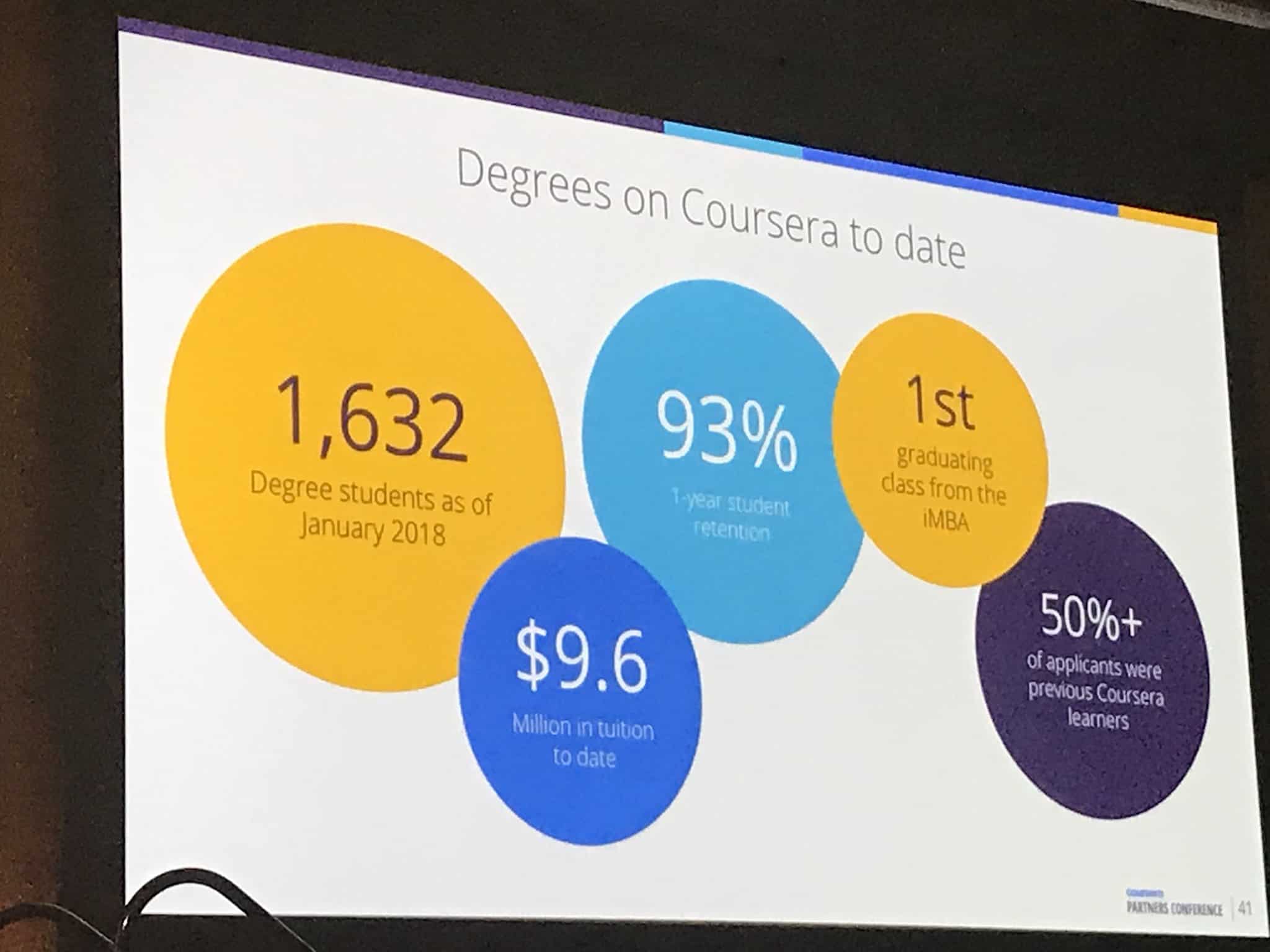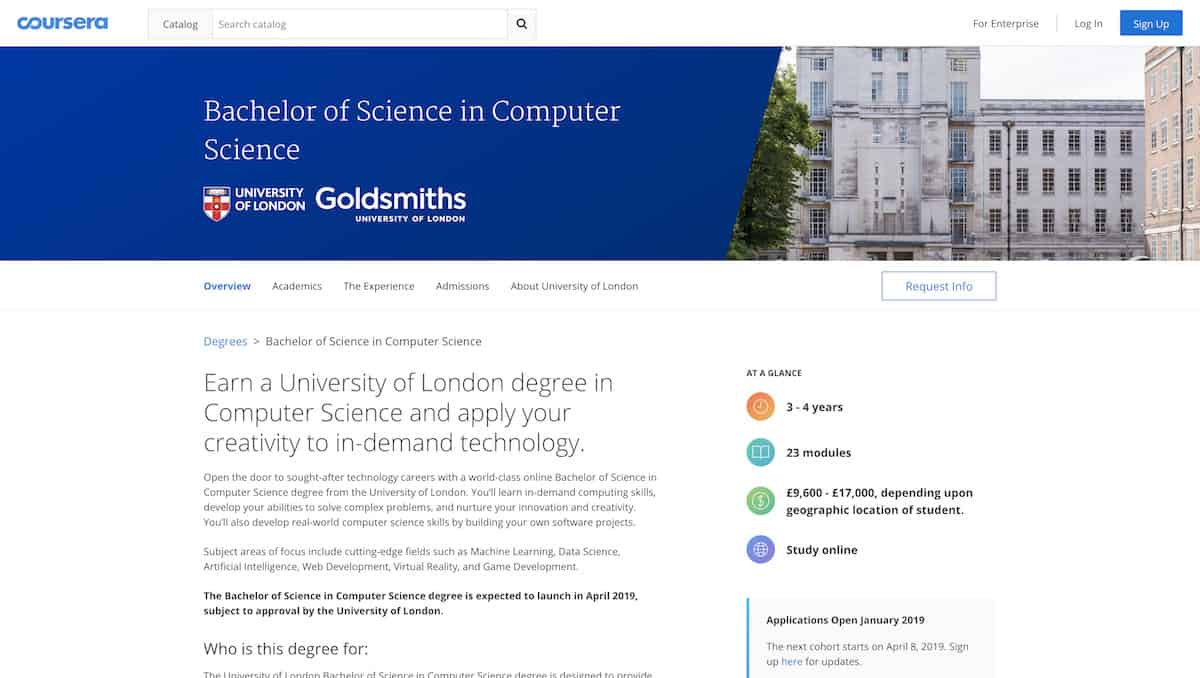Coursera Launches Six New Degrees Including a Bachelors Degree
ASU, Michigan, University of London, and Imperial College London announce completely online degrees offered through Coursera.
Earlier this month, Coursera held their sixth annual Partners Conference at Arizona State Universty. During this conference, Coursera announced six new degrees from five different university partners. One of these degrees came from the host ASU. What surprised me the most was that The University of London announced it will offer a B.S. in Computer Science through Coursera.
In Class Central‘s analysis of the MOOC space in 2017, MOOC-based online degrees were one of the top trends of last year. I concluded that MOOC providers have an advantage over traditional online degree programs as their free online courses act as a highly effective marketing channel to attract millions of new learners. According to Coursera, 50% of their degree students were former Coursera learners.

As of Jan 2018, they had 1632 degree students enrolled in the four degrees that were available. Over 1000 of these students are enrolled in the University of Illinois’ iMBA, the first ever degree to be announced on Coursera. So far, Coursera has earned $9.6 million in tuition from these online degrees. It’s no wonder Coursera is investing heavily in launching more online degrees.
Below is a complete list of MOOC-based degrees that have been announced so far.
Two of the six new degrees are in Public Health, the first non-STEM degrees announced by Coursera. The University of Michigan and Imperial College of London will be offering a Masters in Public Health. Coursera also announced two Master of Computer Science, one from Arizona State University and the other from University of Illinois. The University of Michigan announced a Master of Applied Data Science, which is similar to Master of Computer Science in Data Science from the University of Illinois.
According to Coursera’s Chief Academic Strategist Deanna Raineri, students have regional preferences. Which means that having the same degree from different universities will attract students from the regions where the university’s brand is strong. Deanna also mentioned that Coursera’s degrees will be taught by the same faculty, same curriculum, same learning outcomes, as the residential degree.
But according to Manoel Cortes Mendez, who is currently enrolled in Georgia Tech’s Online Masters of Science in Computer Science, only 4 specializations are available online — compared to 12 on-campus. So maybe the core curriculum is the same, but it would take a while to replicate the entire breadth of a residential degree (if that ever happens).
Coursera’s degrees will also include a mix of closed content and open content i.e MOOCs that are free to audit. We will have to wait and see how much of the content is open. FutureLearn for instance only offers around 1-3 two weeks long “taster courses” for each of its online degrees.
Bachelor of Science in Computer Science

Its the first time that a MOOC provider has launched a Bachelor degree, The Bachelor of Science in Computer Science from University of London will cost £9,600 – £17,000, depending on the geographic location of the student.
I was surprised by this announcement because the target audience for MOOCs is a professional learner. According to the previous CEO of Coursera Rick Levin, the “lifelong career learner” is someone who might be well beyond their college years and takes these online courses with the goal of achieving professional and career growth. Levin defined the lifelong career learner as someone typically between the age of 25 to 45. Eighty-nine percent of Coursera learners are over the age of 22.
Previous attempts like ASU and edX’s Global Freshman Academy haven’t done so well. A Bachelor’s degree also takes significantly longer to complete as compared to a Masters.

Another aspect of this degree is that even though the content will be delivered online, students will have to give exams in one of the university’s approved list of proctoring centers (PDF link). Though these centers are placed through the world, they are limited to a few major cities in each country.








GP
Coventry already has more degrees on futurelearn, which are missing from the list
classcentral
Thanks! Updated the list.
CWS
There is a North American list for University of London proctoring centers.
https://london.ac.uk/sites/default/files/leaflets/examcentres-northamerica_7.pdf
classcentral
Thanks! Updated the article.
Muvaffak GOZAYDIN
Dr Shah
Thanks again for all these wonderful news . You are the pioneer to show directions to the universities as well . Even I suggest you and your team should start some discussions regarding the rules of online degree programs by top school . Here are mine
1.- ONLY and ONLY top schools must provide online degree programs
2.- Students should take only 1 -2 course per quarter or 6-7 courses in a 4 quarter a year . A BA program requires 40 courses . Then 40 / 6 = 6.6 years or 40/7= 5.7 years to complete a complete BA program .
3.- Courses must be same as oncampus courses and by the same professors .
4.- Most important price . I am the expert on price matters . Real cost is less than $ 100 per person per course . Schools must provide at most $ 500 per person per course even $ 400 is enough . There should not free economy here. Media has great responsibility in this regard. Seeing $ 15.000-20.000 tuition are absurd. If I were DOE I would stop it . Or find a way to reduce price, not cost . Cost is already low .
5.- Schools must have consortiums . So a student should be able to take courses from schools within consortiums. That means do not have problem with credit transfers .
6.- Georgia Tech has done a great job. They charge only $ 650 per course . They made lots of money . They could have done even more if they had allowed more admissions . They are very strİct. For a long time they accepted only 3.5 GPA . That is really great . I wonder in case of online if schools accepts LOW academic credentials that is the end of ONLINE . Everybody will say online is bad .
PLEASE NEVER ALLOW LOW ACADEMİC CREDENTİALS FOR ONLINE DEGREE PROGRAMS .
7.- We, employers, are ready to hire online degree holders of University of Michigan, Illinois , Harvard, Stanford, Duke, Yale, ASU , Uni of Penns, PennState and similar first 200 universities .
BUT PLEASE DO NOT CHARGE MORE THAN $ 500 EVEN $ 400 PER 3 – CREDIT COURSE .
Thanks billion again Dr Shah .
Ugo Fred
One of the cardinal ideas of putting courses online and the rise of MOOCs is to democratize learning especially for so-called developing nations. This rising trend of expensive online MOOCs will destroy that promise.
I’m not campaigning for free program but I’m also not for courses that is the equivalent of a year’s salary for middle income workers in developing nations.
Sandro Mancini
Still, much much cheaper than trying to live in London AND pay a full tuition. I agree with you that MOOCs in general should be free, or very inexpensive (just to cover operation costs), but there is a market and a demand for graduation and pos-graduation courses that do not require moving to another country nor paying full tuition. Some cities are just unreasonably expensive to live in, for those not earning in dollars or euros.
Muvaffak GOZAYDIN
Nothing is free in the world . If something is free it is a gimmick to catch you later .
MOOC was just like that . But at least it was a good one .
NOw there are 3 costs delivering education online
1.- The value of the knowledge the university’s knowledge, Like tuition .
Therefore that part is high for high quality schools like Harvard etc .
2.- Develepment of the online versions of the course . It was very high in the past. Now due to openedx.org by MITG free, it is very low . Less than $ 50.000 per 10 weeks long course.
So if you divide it by 5.000 students in 5 years cost per person is only $ 10 .
3.- Cost of portal . Delivery by internet . It is less than $ 1 per year pedr person. It is quoted to me by Blackboard Co .
So I price the value of
Harvard as $ 200 plus $ 10 + $ 1 , say still in total $ 200
MIT same
Stanford same
University of Michigan $ 150 + $ 10 + $ 1 say stiil total is $ 150 per course
University of Illinois same
University of South Dakota $ 100 + $ 10 + $ 1 total is $ 111 OK let it be .
University of Nebraska same
University of Oklahoma same
Right now Georgia Tech charges only $ 660 per course . It is the lowest in the market .
Muvaffak GOZAYDIN
UGO
You are right. Shame on Uni of Illinois to charge $ 21.000 for an MBA program .
It is not even bareable for American people . Wild capitalism will kill the world .
When I was young 30 years old I would say
Price is whatever the customer is willing to pay, learned from America .
Now I am much older I say
Price should be cost plus 10-15 % profit .
martins
GOZAYDIN
I could not agree less with you, I was quite heart broken when I say the cost for the Bsc Program within the range of 9600euros-17,000euros. It simply means I should remove from my mind any thought of taking the course.